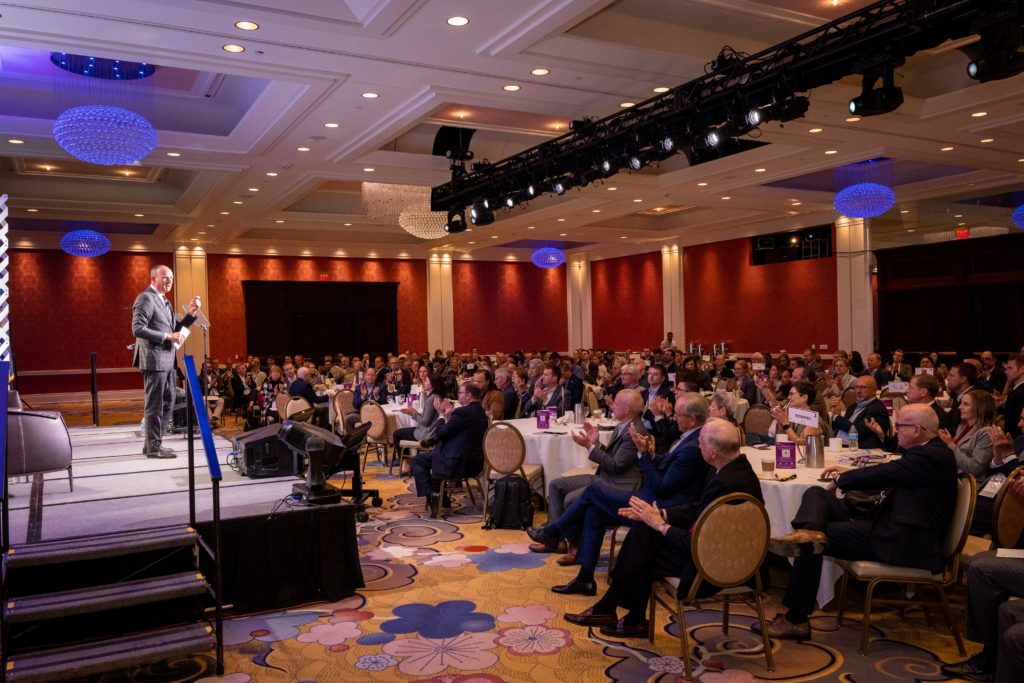On October 20, 2022, over 300 changemakers joined together to drive Michigan forward at the biennial West Michigan Policy Forum Conference in person at the Amway Grand Plaza Hotel in Grand Rapids, Michigan. The focus was to reimagine Michigan’s failing K-12 education and make Michigan a top 10 state for business.
The event started with former Speaker of the House and current WMPF Policy Advisor, Jase Bolger, recapping WMPF’s top priorities and asking how do we move forward and how do we become a top 10 state? The West Michigan Policy Forum advocates for legislative policies that will bring prosperity and jobs to Michigan residents, Bolger shared. We’ve had a number of wins in the last decade, but many of which are currently under threat that we need to defend:
- A-F grading for teachers was never implemented.
- Prevailing wage reform is under attack.
- When policy discussions talk about competing for jobs, too often the focus continues to turn to incentives to overcome challenges rather than fixing our underlying problems.
Bolger thanked Senator Shirkey and Speaker Wentworth, who were present, for their support on these issues and others. And additionally, thanked all elected officials who were in attendance for their commitment and support.
WMPF Chairman, John Kennedy, welcomed participants and asked attendees to listen closely – and be prepared to act after the conference.
The first set of speakers focused on what site selectors prioritize when recommending locations for business investment. Global economic development and infrastructure leader Christopher D. Lloyd, Senior Vice President at McGuireWoods Consulting LLC, took the stage to share how the business climate impacts attraction and retention. According to Christopher, a list of things businesses look for includes infrastructure and talent. What is at the bottom of the list? Incentives. Lloyd offered that incentives have a value or role, but for a site selector they can make a good deal better but don’t make a bad deal good. Further, Lloyd suggested “incentives” should be investments in things that will pay off long term for employers and the community – things like site preparation, infrastructure and workforce training.
Following Christopher, economic policy studies expert Dr. Stan Veuger, Senior Fellow at the American Enterprise Institute (AEI), shared his analysis of the barriers currently holding Michigan back from being a top 10 state, highlighting the ease of doing business, permitting, and talent as key factors.
To react to both speakers, Doug DeVos moderated a compelling panel with Matthew Haworth of Haworth Inc., Chelsea Keeton of Grand River Aseptic Manufacturing, and Randy Thelen of The Right Place about how we attract businesses to West Michigan. Haworth led the charge opposing incentives for businesses, encouraging us to look at broader policies that make Michigan a better place to start and grow a business. Thelen recognized that incentives are just part of the total package that attracts businesses to locate here. Keeton shared her perspective on the talent and culture that lead her company’s expansion in West Michigan.
Following a break, Donald P. Nielsen, Senior Fellow & Chairman at the American Center for Transforming Education at Discovery Institute shared his experience and passion for rebuilding public education. Nielsen has devoted more than 30 years to revamping public education and detailed how it’s possible to transform education in Michigan. During the passionate remarks, he urged structural change at the leadership level saying, “If we want to change our public education system it has to start with the state – where the control is.” Nielsen encouraged Michigan to pursue these next four steps to transform education: school choice, districts of innovation, leadership institute and teacher pipeline.
A second reaction panel, moderated by Bolger, included thoughts and experiences from Michigan State Representative Pamela Hornberger, John Kennedy of Autocam Medical, and Kelley Williams-Bolar, a School of Choice Advocate. Williams-Bolar connected with conference attendees by sharing her story of being sent to jail for using her father’s address in Ohio to enroll her children in a better school.
The event wrapped up challenging all attendees to take this information and continue to push for meaningful change that will transform Michigan’s K-12 education system and attract businesses to locate and grow in Michigan.


